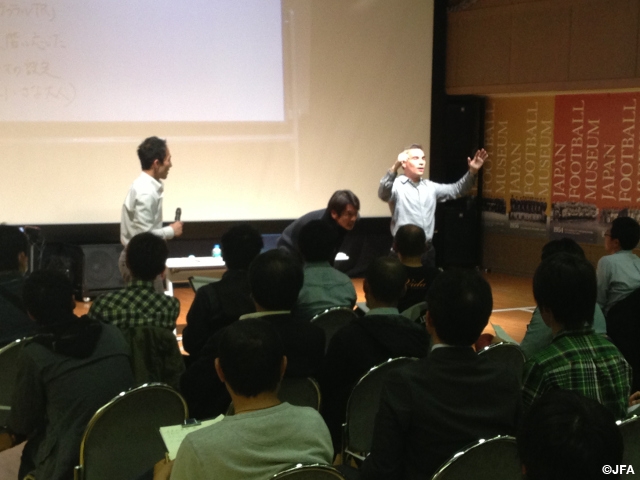NEWS
Japan's futsal boss Rodrigo lectures training for each age category
18 April 2014

JFA held a coaching training session for futsal coaches about "training for each age category" as Miguel Rodrigo, the head coach of Futsal Japan National Team, being the guest speaker. 121 participants attended and paid close attention to the presentation about how to approach and train players of each age category in an optimum way.
Guest Speaker Comment
Miguel Rodrigo, Futsal Japan National Team Head Coach
Today's topic may not be a very popular one, but I was looking forward to giving a speech about it.
In the first half of the speech, I talked about "3 fundamentals to follow in training young players."Those three keys are
1. Changing "Rules", "Pitch size" and "Ball" depending on the level of physical and mental development.
2. Number of touches a player makes with the ball affecting the players' development of both motivation and skills.
3. Planning technical and strategic objectives of each training with understanding where players are in the mental, cognitive, physiological and athletic development curve. (Understanding "Children are not small adults.")
These three keys seem very simple, but not fully understood, so in many cases mistakes are being made in training young players in terms of training methods and educational evidence. I talked with some case studies about how effective it is for coaches to understand these things and provide "problem-solving type" of training. I also presented my perspective that "letting players think about, learn and improve" individual and team skills is being one of the big issues that Japan's football currently faces.
In the second half of the speech, I focused on issues of training players aged 12 and 13 years. Before this age category, futsal and football are supposed to deal with almost the same kind of plays and trainings. But at age 12 or 13 and older, children start being able to learn plays unique in futsal, different from football, as part of their both physical and mental development. They start understanding differences between two sports and the separation of the two becomes clearer and clearer.
It would be my great pleasure if my speech could have inspired the perspective of coaches here today in terms of optimum training for each age category.
Participants Comments
Mr.ENDO Ryosuke
It was an easy presentation to understand, and it was also good that it talked about football as well as futsal. Him taking about the specific differences of coaching styles between Japan, Brazil and Spain made it easier for us to understand. His idea of intentionally giving small children a ball that doesn't bounce very much and not letting them try too much to kick it far was interesting.
Mr.YOSHINO Akira
It was my first time to listen to a presentation about coaching U-13 players. I learned so much about what kind of training should be given to players of that age. Now we still talk about and play football much more, but I think it will be good to have more players choosing futsal, dreaming of playing in the F-League and practicing for it. Mr. Miguel's presentation was very logical and easy for us to understand, and his teamwork with the interpreter was also very smooth and easy for us to follow.
Mr.KAWAMURA Jyunki
It was very informative to listen to the current head coach of Futsal Japan National Team. It made me want to learn much more. I hope to have more opportunities like this. Both his presentation and the interpreter's work were very easy for us to understand. He gave us clear reasoning for everything he suggests, so that made it easier for us, too. I will definitely try the training methods I learned today with my team.
Latest News
-
National Teams
2024/04/23
【Match Report】U-23 Japan National Team lose to Korea Republic to advance to knockout stage as runners-up - AFC U23 Asian Cup Qatar 2024™

-
National Teams
2024/04/20
【Match Report】U-23 Japan National Team advance past group stage with two consecutive clean sheets - AFC U23 Asian Cup Qatar 2024™

-
National Teams
2024/04/17
【Match Report】U-23 Japan National Team win first group-stage match despite playing with 10 men following first-half sent-off - AFC U23 Asian Cup Qatar 2024™

-
National Teams
2024/04/12
U-17 Japan Women's National Team squad & schedule - AFC U17 Women's Asian Cup™ Indonesia 2024 (4/27~@Chiba, 4/29~@Thailand, 5/3~@Indonesia)

-
Referees
2024/04/05
YAMASHITA Yoshimi, TESHIROGI Naomi, and BOZONO Makoto named to officiate matches in the Games of the XXXIII Olympiad (Paris 2024)


